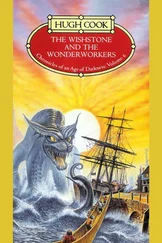Hugh Cook - The Wazir and the Witch
Здесь есть возможность читать онлайн «Hugh Cook - The Wazir and the Witch» весь текст электронной книги совершенно бесплатно (целиком полную версию без сокращений). В некоторых случаях можно слушать аудио, скачать через торрент в формате fb2 и присутствует краткое содержание. Жанр: Фэнтези, на английском языке. Описание произведения, (предисловие) а так же отзывы посетителей доступны на портале библиотеки ЛибКат.
- Название:The Wazir and the Witch
- Автор:
- Жанр:
- Год:неизвестен
- ISBN:нет данных
- Рейтинг книги:5 / 5. Голосов: 1
-
Избранное:Добавить в избранное
- Отзывы:
-
Ваша оценка:
- 100
- 1
- 2
- 3
- 4
- 5
The Wazir and the Witch: краткое содержание, описание и аннотация
Предлагаем к чтению аннотацию, описание, краткое содержание или предисловие (зависит от того, что написал сам автор книги «The Wazir and the Witch»). Если вы не нашли необходимую информацию о книге — напишите в комментариях, мы постараемся отыскать её.
The Wazir and the Witch — читать онлайн бесплатно полную книгу (весь текст) целиком
Ниже представлен текст книги, разбитый по страницам. Система сохранения места последней прочитанной страницы, позволяет с удобством читать онлайн бесплатно книгу «The Wazir and the Witch», без необходимости каждый раз заново искать на чём Вы остановились. Поставьте закладку, и сможете в любой момент перейти на страницу, на которой закончили чтение.
Интервал:
Закладка:
Let us consider now the fate of Log Jaris and his party.
When these could run no more, they stopped: and looked back to see how close the mob might be.
Here it would be pleasing (and profitable) to give this history more narrative appeal than it possesses by inventing some glamorous incident of unparalleled heroism. Such things have favour with a great many readers. Take, for example, the popularity of those gross and simplistic tales which are told about Vorn the Gladiator.
Vorn has a pass he must hold against the hundreds of the Dreaded Hordes of the Cruel Beaked Things from the Nethermost of the Nether Depths. He is alone, for all have abandoned the pass saving for himself alone. On come the Cruel Beaked Things, and their very giggling is itself a horror to hear.
‘It is a good day to die,’ says Vorn the Gladiator, and kisses the bright blade Zaftig.
Then the first of the Cruel Beaked Things is upon him.
Not only is it beaked, it is taloned as well. It stands thrice as tall as a horse and has breath four times as bad as that of the legendary Skork, she who was the Great Whore of the island of Chay. But it will take more than a Cruel Beaked Thing to overcome a hero.
‘Die!’ screams Vorn.
Zaftig slices the air with a scream like that a baby gives when a professional child beater brands the squalling thing with hot iron.
The first of the Cruel Beaked Things flops away, mortally wounded, its intestines sprawling in the dust as it jerks this way and that in its agony.
On come the rest of the Cruel Beaked Things, but Vorn treats them likewise, to the great delight of his many fans. Before the day is done, all the Cruel Beaked Things are dead; and the greatest danger to Vorn’s health and safety is the danger that he may slip on the greasy blood which so liberally layers the snows.
However, such things lie in the realms of fantasy; and a historian is confined within the strict boundaries of reality, and may not deviate from them, however hard his bank manager happens to be pressing them.
The truth is this:
When Dardanalti and his friends stopped and looked back, they saw no battle, no crisis, no conflict. Instead, the scene which lay before them was very much a still life, for the mob was nowhere in sight.
‘They’ve vanished!’ said Nixorjapretzel Rat in astonishment. ‘How did they do that?’
Pelagius Zozimus, wise in the ways of wizardry and of other exerci ses of Power, studied the scene which confronted him then gave an expe rt’s appraisal: ‘Probably, Jan Rat, the mob went back through the door out of which they came in the first place.’
‘But why?’ said Rat. ‘Why would they do that?’
‘The sun was too hot, perhaps,’ said Zozimus. ‘Or it could be the view was not to their liking.’
In truth, the matter was a mystery to Dardanalti and Co., for they had thought this mob to be Ek’s mob, a religious mob intent on the murder of enemies of Zoz the Ancestral. Accordingly, they were unable to understand why the mob had so lightly abandoned the pursuit of their quarry.
Once we know the facts of the matter, the mystery disappears. The facts are simple. This was not a mob animated by religious mania, for the heart of this rabble was provided by those driven by economic motive; and they, once realizing they had the palace at their mercy, were more than happy to retreat from the sun and content themselves with plunder.
Therefore Juliet Idaho and Shanvil Angarus May waited in vain at the gates of the mausoleum, their homicidal desires temporarily thwarted; and Log Jaris and his companions had no pursuers to outrun.
‘Well,’ said Zozimus, wiping the sweat from his forehead. ‘What a letdown.’
‘Can I go now?’ said Rat hopefully.
‘Well,’ said Pelagius Zozimus jovially, ‘now we’ve no further use for you, we might as well cut off your head!’
This was meant as a joke, but proved to be one of the largest mistakes that Zozimus had ever made in his life. For Rat, in the face of what he believed to be his immediate doom, made one supreme effort. And there was no quick-bladed Idaho to chop off his head.
As we have already noted, partial demonic possession — the sorcerors of Injiltaprajura prefer to refer to it as ‘inspiration’ — is not the most reliable source of Power. Nevertheless, when that Power works, it tends to work with a vengeance.
‘Shafo!’ screamed Rat. ‘Shafo shafo!’
Then Rat flung out his hands, pointing rigid fingers at Pelagius Zozimus.
Rat’s intention was to turn Zozimus into a cockroach.
And then to step on him.
There was a roar from Zozimus as he felt himself Changing.
A great flailing of limbs as Log Jaris tackled young Rat from behind and brought him crashing down to the dust.
Then a flickering bewilderment of images as Zozimus blurred from human to cockroach, from cockroach to crab, from crab to cat, from cat to seagull, and then in turn to dragon and basilisk. Such was the weltering speed of these transitions that a vast column of dust was kicked up by the snapping, kicking, striving, scraping, squalling, shouting thing which Zozimus had become.
‘Oh shit,’ said Odolo.
And here we leave the unfortunate Nixorjapretzel Rat and the ever-transforming Pelagius Zozimus, for our history bids us Downstairs, where we find the Empress Justina fleeing in company with Chegory Guy, Olivia Qasaba, Ivan Pokrov and Artemis Ingalawa. In following the fate of these people, we must replicate Odolo’s comment (cited above) for Chegory Guy shortly gives voice to a similar sentiment when he (together with his travelling companions) is cornered downstairs by a Dorgi.
CHAPTER TWENTY-FOUR
The dorgi — last of all its breed, but no less dangerous for that — was a huge grumping machine with a pronounced propensity for violence. It was huge, heavy, brown and bulbous. A hulking thing stubbled with inscrutable protruberances. A monstrous thing which moved upon its victims with a sound like heavy breathing. This disconcerting apparition cornered Justina and her companions in a blind alley Downstairs.
‘Oh shit!’ cried Chegory.
‘Chegory!’ screamed Olivia. ‘Chegory!’
He clutched her to his flesh and they clung together fiercely. As if clinging was going to do them any good!
Artemis Ingalawa — in a move equally as futile — raised her voice in a battle-shout as she slid into a combat stance. Fortunately, the dorgi failed to recognize this as an act of aggression. It was already angry enough to kill, and the thunderous rage in its voice was unmistakable as it shouted at the humans. While it shouted, it trained its zulzer upon its captives, threatening to atomize them.
Only Ivan Pokrov could understand the dorgi’s furious outburst. Pokrov had long preserved a knowledge of the tongues of the Golden Gulag by conversing with others who had survived the destruction of that Empire. Over the last few centuries, for example, he had maintained his knowledge in current use by conversing thus with Shabble.
‘What does it say?’ said the Empress Justina.
She did not expect to be answered. Even so, she asked, for the habits of command were deeply engrained in her psyche. Her question, addressed to the air as it was, was answered by Pokrov.
‘It says,’ said the analytical engineer, translating from the Code Seven in which the dorgi was speaking, ‘that we are to get aboard.’
‘Aboard?’ said Justina in bewilderment. ‘How can we? It’s not a ship.’
‘We climb on top of it,’ said Pokrov. ‘As if it were a cart or a liferaft.’
‘What if we don’t?’ said Ingalawa.
Trust an Ashdan to ask a question like that! Justina Thrug was the daughter of a Yudonic Knight, and a formidable warrior in her own right; but Justina had never suggested disobeying the dorgi directly. It took the violent pride of an Ashdan to suggest that.
Читать дальшеИнтервал:
Закладка:
Похожие книги на «The Wazir and the Witch»
Представляем Вашему вниманию похожие книги на «The Wazir and the Witch» списком для выбора. Мы отобрали схожую по названию и смыслу литературу в надежде предоставить читателям больше вариантов отыскать новые, интересные, ещё непрочитанные произведения.
Обсуждение, отзывы о книге «The Wazir and the Witch» и просто собственные мнения читателей. Оставьте ваши комментарии, напишите, что Вы думаете о произведении, его смысле или главных героях. Укажите что конкретно понравилось, а что нет, и почему Вы так считаете.












